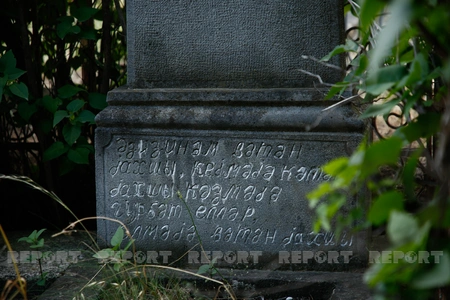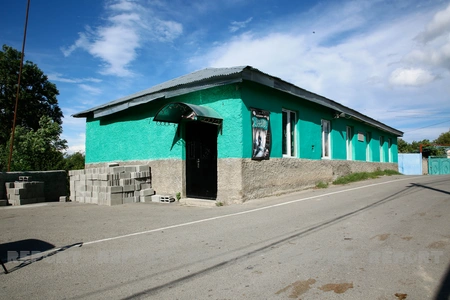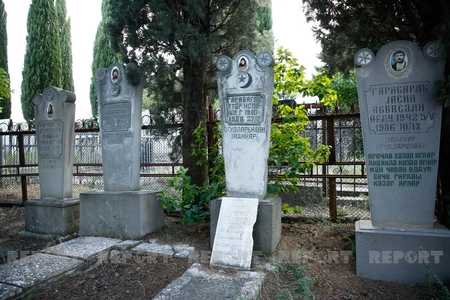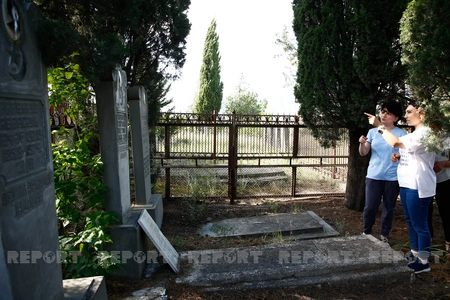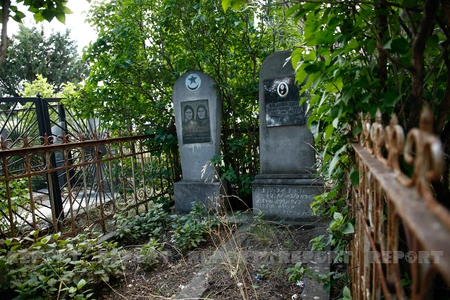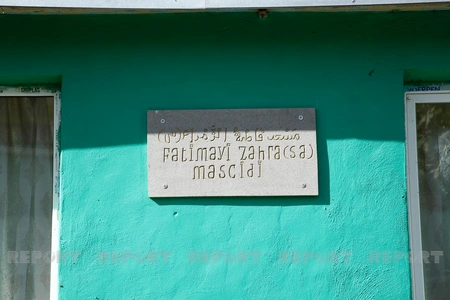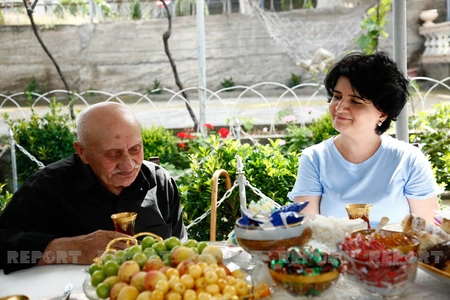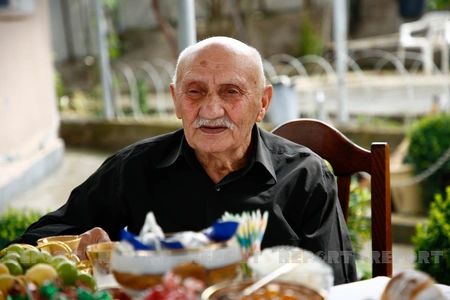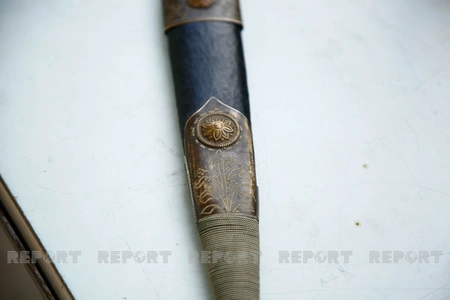Azerbaijanis expelled by Armenians from Aghdam 200 years ago - REPORT from Georgian village of Garabaglilar
- 30 July, 2022
- 07:25
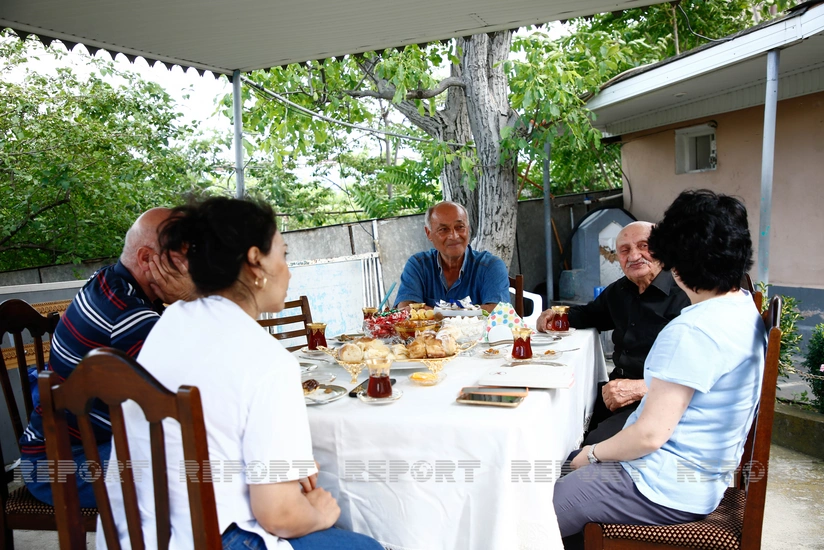
Over the past 200 years, the Azerbaijani people have repeatedly faced the tragic and painful stages of a policy of targeted ethnic cleansing and genocide by Armenians. Thousands of Azerbaijani residents of Karabakh who became victims of this policy were forced to leave their native lands and found refuge in neighboring Georgia.
Employees of the Georgian bureau of Report visited the region of Karabakh residents in Georgia - the village of Garabaglilar, studied the history of the resettlement of Azerbaijanis to the neighboring country and the creation of the village.
The Muradbeyli family expelled from the Muradbeyli village
One of the Azerbaijanis who were forcibly and cruelly deprived of the right to live in their native land and found refuge in neighboring Georgia is the family of Murad Muradbeyli, a resident of the Muradbeyli village in the Aghdam district. He, with four sons and two daughters, went to Georgia, where he lived in the Kaspi district. The descendants of the Muradbeyli family, who left their native lands, now live in the village of Changilari. This village is better known among the people under the name of Garabaglilar.
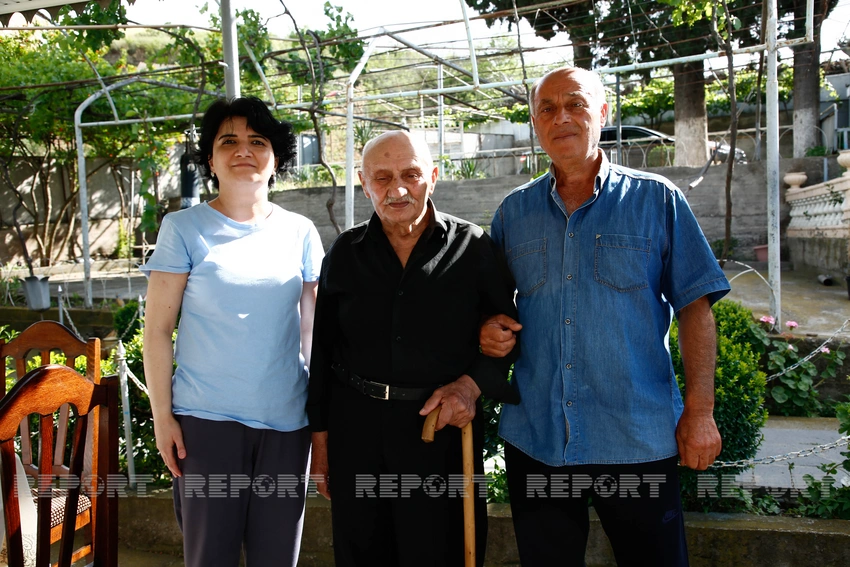
The Kaspi district belongs to the Shida Kartli region in eastern Georgia, the village of Changilari is located 54 kilometers from Tbilisi.
We are heading to the village with ashug (a folk singer and storyteller among the Azerbaijanis) Nargila Mehdiyeva, who comes from the village of Garabaglilar on her mother’s side. We were received in the family of Muradbeyli’s family member Gulu Jafarov.
The most painful period in Muradbeyli's life was expulsion from his native Aghdam. In order to flip through the pages of this story, we talked with the oldest resident of the village, Safar Jafarov. 89-year-old Jafarov spoke about the reasons that forced his grandfather Murad to move to Georgia.
During the conversation, it becomes known that the Muradbeyli family in 1813 faced the cruelty of their Armenian neighbors in the village of Muradbeyli. According to Jafarov, as a result of a fight provoked by the Armenians in the village, several members of the family were brutally killed. Persecuted by the Armenians, Murad Muradbeyli, together with his four sons and two daughters, went to Georgia at night. When they left, they were forced to leave their cattle, taking with them only gold jewelry. Four brothers and another daughter of Murad Muradbeyli went to Iran. Their fate is still unknown.
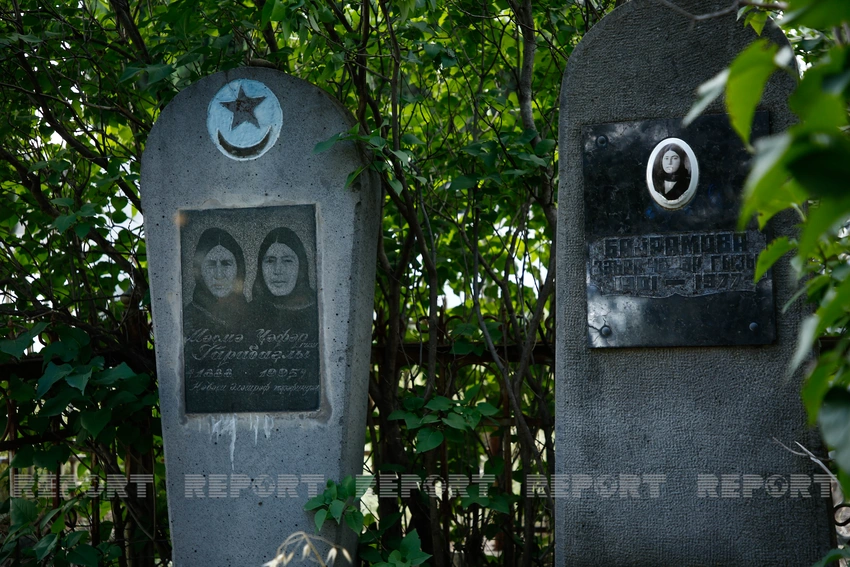
The land obtained as a result of Aghdam resident’s taming wayward horse of the Georgian master
Jafar Muradbeyli worked as a servant in the house of master Mukhran in the village of Mukhran. The resettlement of Muradbeyli family in the village of Changilari is connected precisely with Jafar Muradbeyli. Safar Jafarov told the following story: “Batono (master in Georgian – ed.) Mukhran inherited a wayward horse from his grandfather. Once he said that he would give anything to a person who would tame this horse. My grandfather Jafar agreed. They brought a horse and told him that he was unlikely to be able to saddle the horse, because the horse would throw him off. Grandfather Jafar did not listen to anyone and said that he would saddle the horse. My grandfather asked for a woman's shawl. He carefully walked around the horse, closed one eye of the horse and threw the shawl on the horse’s back. The horse jumped away, kicked, reared up, and my grandfather saddled him. Then he fed the horse with grass. He rode the horse for so long in the field that the horse could no longer go further. The animal was tired. When the master asked grandfather Jafar about his desire, he asked for land. The master gave the land, and my grandfather and his three sons settled on this land. They bought cattle with the gold brought from Aghdam. They managed to increase the livestock to 20,000-30,000 head.”
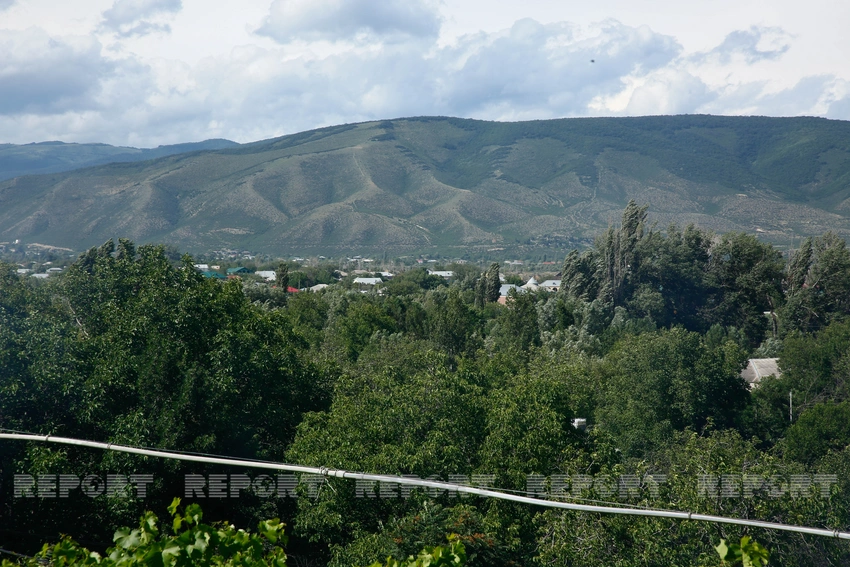
Grandfather Jafar lived in the village for 20 years. After his death, the descendants of the Muradbeyli family took his name as a surname. The descendants of the Muradbeyli family bear the surname Jafarov.
Impossible return to Aghdam
Safar Jafarov said that his grandfather Jafar Muradbeyli decided to return to Aghdam five years later. I secretly went to the village and saw that there was no stone left unturned.
The son of our interlocutor, Gulu Jafarov, who joined the conversation, said that Georgians used to live in the village, who then moved to another place and vacated the village: "When our people came here, there were thickets, wolves. Settlers from Karabakh rebuilt the village, they were engaged in cattle breeding."
Settlers from Karabakh who own orchards were left without water
During the conversation, it turned out that there are 60 houses in the village. Local residents are united by family ties. Speaking about the problems in the village, the residents say that earlier in the village there were fruit-bearing orchards, bean, onion fields. However, after the August 2008 war between Georgia and Russia, ditches supplying the village with irrigation water were destroyed. The only problem of the village supplied with electricity and gas is the lack of water. The need for water is replenished by yard wells. Relevant structures promise to repair ditches, but promises remain unfulfilled for years.
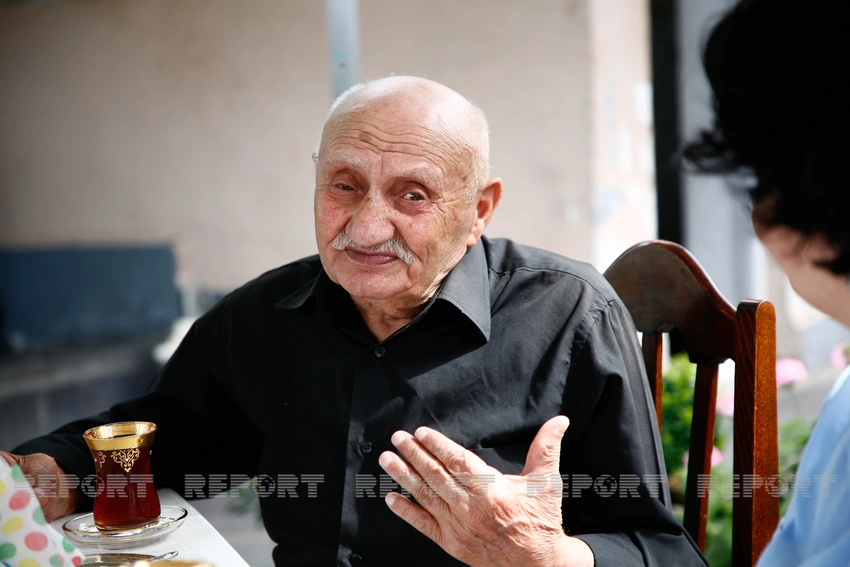
The settlers from Karabakh do not have a school, their children study in the schools of the neighboring village. There is a mosque in the village, which the residents built at their own expense.
Jafarov said that after the war he moved to Baku and lived for 9 years in the Yeni Gunashli settlement. But attachment to the village, relatives who remained there forced him to return.
Our interlocutor graduated from Ivane Javakhishvili Tbilisi State University. For many years he worked in the law enforcement agencies of Georgia with the rank of police major. Then for 20 years he was the head of a farm in the Kaspi district.
"My homeland Aghdam, which I have not seen"
His greatest desire now, like all Aghdam residents, is to go to Aghdam, liberated from almost 30 years of occupation. He expressed regret that he did not see Aghdam - his homeland: "I only want to see the land of my ancestors, then I can die. I gave my word that I would kiss the earth when I set foot to the native land."
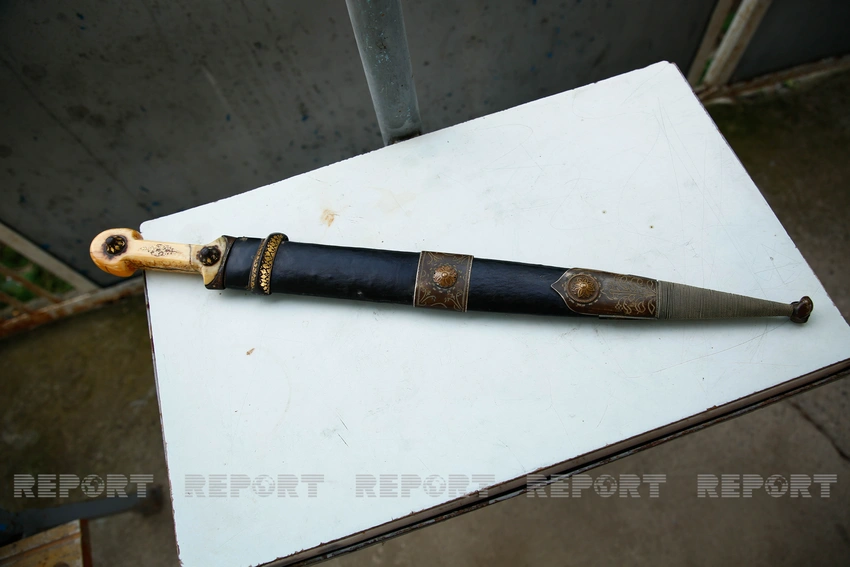
"We prayed for the Azerbaijani army"
Jafarov says that during the Patriotic War of Azerbaijan, great excitement was felt in the village of Garabaglilar: “In those days, we could neither eat nor sleep. We prayed for the victory of the Azerbaijani army. We watched with excitement the speeches of Azerbaijani President Ilham Aliyev on TV. We cried and rejoiced. The iron fist of Ilham Aliyev showed its strength, we felt great pride. We are very happy to watch concerts in Shusha on Azerbaijani TV channels. May Allah protect Azerbaijan and the head of state."
Dagger and prayer beads in memory of Aghdam
We asked our interlocutors about the items left in memory of Aghdam. Gulu Jafarov showed a dagger and prayer beads left over from his father.
The people of Aghdam once had a Karabakh carpet, but due to financial difficulties, the family was forced to sell the carpet.
Soil from the Motherland as a gift and a symbol of Victory
At the end of an interesting conversation, we told Safar Jafarov about the gifts we had brought. He was very surprised by the unexpected gifts, especially the soil from the Motherland, which he had never set foot on. Our second gift is a small carpet with the Flower of Karabakh, the khari bulbul (Ophrys Caucasica), which is the symbol of victory in Azerbaijan’s Patriotic War. This carpet was presented by the Azerbaijani Embassy in Georgia to the local bureau of Report on the occasion of December 31 - the New Year and the Day of Solidarity of World Azerbaijanis. Although they say that it is not good to re-gift gifts, but for a Karabakh citizen who has been living with longing for his homeland for many years, a carpet is a more valuable gift.
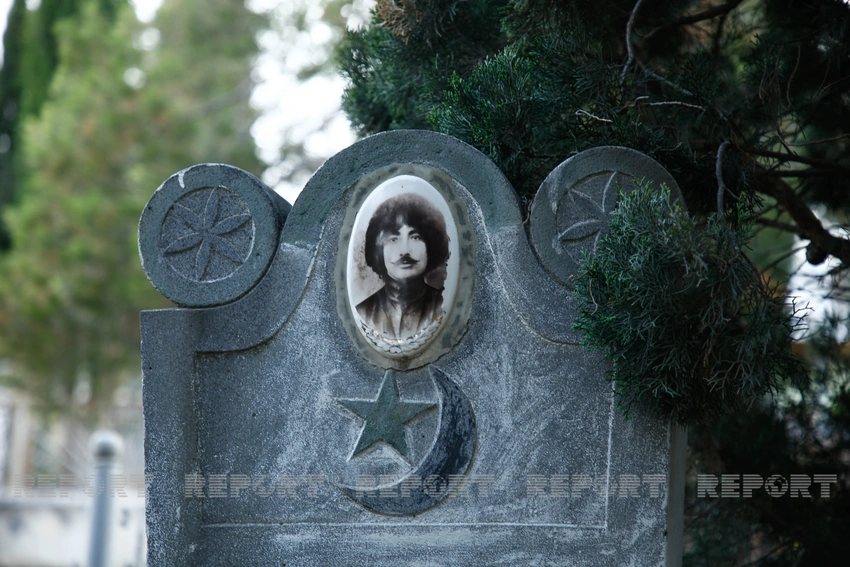
Hope to see Aghdam
Our compatriot will turn 90 next June. We wish him a long life and we wish he celebrate his 90th birthday in Aghdam. Saying goodbye to him, we said that we would try to help fulfill his dream. Our interlocutor said that he would scatter the gifted soil at the threshold of his house.
The people who passed away with longing for Karabakh
We are going to leave Garabaglilar and decide to visit the village cemetery. We are heading to the old graves, visiting the graves of the Muradbeyli family. We see that on the graves of all members of Jafar Muradbeyli’s family, the word "Karabakh-native" is written before their names and surnames. Azerbaijanis, proud that they were born in Karabakh, have found eternal peace with longing for Karabakh.
We return to Tbilisi and share the opinion with our travel companions that the end of the 30-year Armenian occupation of Azerbaijani lands also means finding peace for the restless souls of the Karabakh people who were evicted from their homes 200 years ago.
Safar Jafarov’s story is a ready-made script for a documentary full of interesting historical facts.
We part with him with confidence that not long is left until the day when the Karabakh people set foot on the land of liberated Karabakh, and we will tell Jafarov the good news that we will take him to Aghdam.


